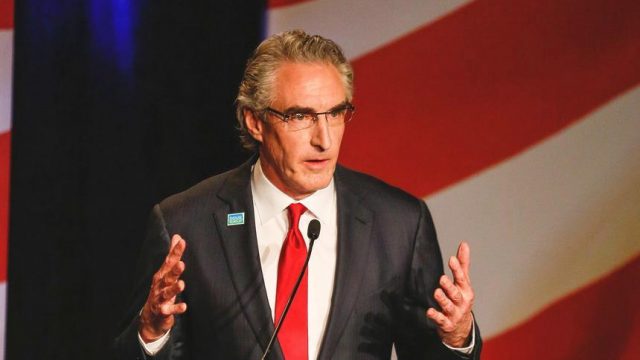Audio: Governor Doug Burgum Talks Property Taxes, Homeless Shelters, Pay for Public Employees

Lawmakers have said they want to finish the 2017 session with 10 of their 80 constitutionally allotted days left. Today was day 65, which means to hit that goal they’ll have to be done by the end of next week.
Governor Doug Burgum was on my radio show to discuss the issue still lingering as those days count down.
We talked about the property tax issue I wrote about earlier today, and I asked him if he felt lawmakers might still pass bills to take over local social services and/or fund the 12 percent property tax buy down.
“It’s not over until it’s over,” he said adding that those issues will “probably get decided in the final days.”
Burgum said the state increasing its role in local funding has probably caused property taxes to come down “in many parts of the state,” but said those buy downs were in some cases “subsidizing local spending.”
He said the long term solution “more efficient communities.” Burgum’s referencing his passion for urban planning, and his preference for denser development which cuts down on costs for things like snow removal, police protection, school districts, etc. But really that’s just another way of saying that the best way to control property taxes is to control local spending.
Which is something many critics of the Legislature’s past approach to property taxes – including this one – have been saying for some time.
I also asked Burgum about the controversy over funding for homeless shelters. The House Appropriations Committee moved those grants, along with some others, into a discretionary line item. Democrats and other critics have been calling that a cut, but Burgum says he sees it as adding budget flexibility.
“Just because they’re giving more flexibility doesn’t mean they’re de-prioritizing,” he said.
A caller asked Burgum about his proposal to have state employees pick up 5 percent of their health care costs (currently the state pays 100 percent). Burgum said he wasn’t sure if that proposal was in any current bill being considered by lawmakers, but said he still supports it.
“We can get great people to work for North Dakota while paying a part of their health care,” he said. The caller suggested that increasing what state employees pay for health care, while not giving them a pay raise, amounted to a pay cut. Burgum countered by pointing out that over the next biennium health insurance costs for the state are expected to see a “17 percent compounded increase” which, absent reform from lawmakers, will be paid for entirely by the state.
The suggestion being, I guess, that the state covering increasing costs for employees is its own sort of compensation increase.
Overall Burgum said he’d rather see state employees get higher salaries while paying for a part of their own health insurance.
Here’s the audio:
[fcc_jw_podcast key=”C9qh27ra” player-image=”139345″]




